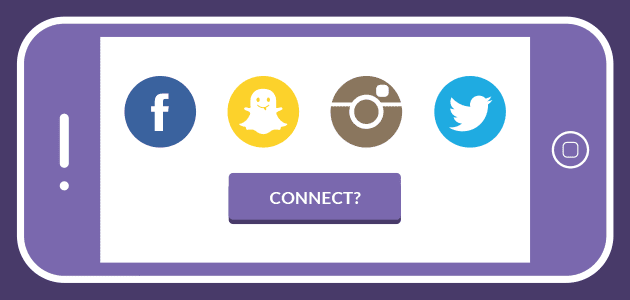Is Facebook in decline?
We keep reading that young people prefer Snapchat, WhatsApp, Instagram and Twitter to Facebook these days.
Apparently if you use Facebook you are ‘officially old and uncool’. Or so a recent report tells us. This Global Social Media Impact study suggests that the reason for teenagers apparently leaving the site in droves and moving onto sites like Snapchat, is simply that too many mums are on there.
Parents have worked out that Facebook, rather than being a place of exposed danger is actually an easy way to find out what their teenagers are up to. Even more embarrassing for these teens is that their parents have started to post their own pictures and comments on news-feeds.
There’s no doubt that teenagers have and always will crave privacy from their parents and they certainly don’t want their parents knowing EVERYTHING they get up to. So perhaps they should take a moment to think before they post.
Snapchat and teens
An estimated 350 million Snapchat images are sent daily. Why? Because these mobile messages and photos disappear without trace once the receiver has viewed.
Teenagers are well known for their risk taking behaviour, and are also less inhibited when posting online, compared to the older generation. Many use snapchat to send funny pictures to friends, but some are also ‘sexting’ using this app. The basis of Snapchat is that it is a picture or text that is protected, with the message vanishing in seconds. Undoubtedly it’s a genius idea and The App has just won an award at the annual “Crunchies”.
However some Snapchat recipients are already using screen shots, if they are quick enough, to capture these pictures for an eternity. Others report being able to upload pictures before opening them or exposure of an email address unknowingly.
Snapchat probably isn’t going to play a significant role in the course of society, but for now it will allow teenagers some privacy from the prying eyes of ‘The Parent’.
It’s no wonder that Facebook made a bid for Snapchat.
What is Whatsapp?
Although Facebook’s bid for Snapchat was disappointingly unsuccessful, Facebook certainly recognise that there is a shift in how the younger generation connect. They have recently cheered at their (rather expensive $19 billion) purchase of Whatsapp – which is estimated to be on the way to connecting 1 billion. Part of WhatsApp’s appeal is that it is a cross platform so it doesn’t matter which device it is installed on. Messages can be sent to anyone who has the app, and it supports many messaging types including general texts, pictures and audios. All this is sent to as many friends as you choose for free.
Jan Koum founder of Whatsapp says of his new partnership with facebook’s Mark Zuckerberg ‘WhatsApp’s extremely high user engagement and rapid growth are driven by the simple, powerful and instantaneous messaging capabilities we provide’.
A picture is worth a thousand words
Instagram allows a user to take pictures or videos, apply filters to them, and share them onto a social network site.
Instagram pictures have character according to CEO Kevin Systrom who says, ‘Instagram is focused on capturing these world’s moments….the important part on Instagram is being able to go back to (these moments) to have a conversation, and if they’re not there anymore, you can’t have that conversation and see who has liked it.’
Part of Instagram’s appeal to teenagers is that you can’t ‘upload loads of boring albums at once.’ Instagram pictures are ‘selected’ by a user.
The downside may be that this isolated snapshot could portray beautiful, fun, exciting and successful worlds and amplify how ‘great’ other peoples lives seem. This encourages friends to respond with more of the same. What is actually posted gets further away from reality. We certainly don’t know the whole story from a single picture, yet we make a sudden decision based on the pictures we see.
There is no doubt that a picture can elicit powerful emotions and memories that would be otherwise forgotten.
Twitter connects you with people you wish you knew
Whereas Facebook connects you with the people you know or knew, Twitter connects you with the people you wish you knew. The appeal of Twitter is obvious: There is a current obsession of celebrity, and followers can feel as though they are part of a celebrity lifestyle. Another appeal is the microblog format of tweets, which allows only 140 characters per tweet. As well as making these quick ‘Tweets’ a user can send out or follow news-briefs and ads. Twitter could improve an individual’s chances of finding a job either by announcing availability or by searching the job openings listed on there. Twitter can also provide quick answers to even the most obscure questions. It’s basically a ‘cool’ way to keep up with the latest news.
Does Facebook still have the edge?
Facebook seems to be the winner in terms of technicality, beating the other popular sites; Snap-chat, Whatsapp, Twitter and Instagram. ‘It is more integrated, better for photo albums, organising parties and more effective for organising people’s relationships’ reports Professor Miller from the University College London.
On Facebook, the photos and posts don’t instantly disappear, but there is a delete button. Facebook seems to represent a more realistic view. You might post the most flattering picture of yourself, but you can guarantee the one of your ‘friends’ will counteract that with a less aesthetically pleasing version. Additionally you get a more balanced view of events with comments, photos, tags and updates.
It’s also the one that people “always come back to” according to Iain MacKenzie from Facebook.
All of these Social Media sites have their own unique appeal and have each played a part in the way we communicate with each other the world over.
But for now I am going to be ‘officially old, boring and uncool’ and stick with Facebook. What do you think?
